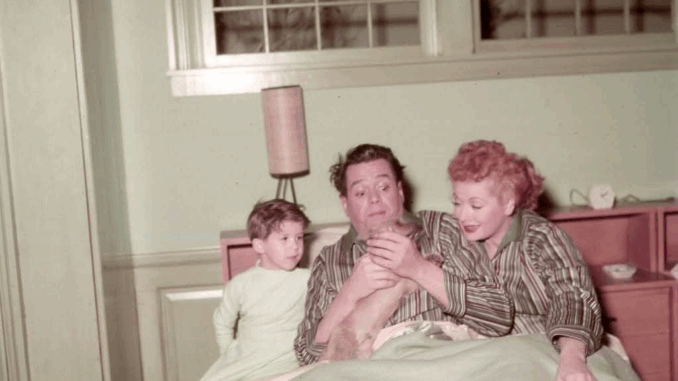
When I Love Lucy premiered in 1951, it quickly became a television phenomenon. Lucille Ball and Desi Arnaz’s groundbreaking sitcom not only entertained millions but also reshaped the very foundation of television comedy. Yet behind the laughter, the show was not immune to turmoil. Off-screen conflicts, personal struggles, and behind-the-scenes battles often threatened to disrupt the magic that viewers saw on screen.
The Marriage at the Center of the Storm
At the heart of the series was the real-life marriage of Lucille Ball and Desi Arnaz. Their undeniable chemistry carried over into their characters, Lucy and Ricky Ricardo, giving audiences a charming portrayal of domestic comedy. But privately, their marriage was far from the lighthearted adventures shown on screen.
Desi’s heavy drinking, late nights, and rumored infidelities placed constant strain on the couple. Lucille, deeply committed to keeping both her marriage and the show alive, often had to navigate personal heartbreak while performing as America’s favorite housewife. Their turbulent relationship spilled into the production at times, creating tension that crew members and co-stars could feel on set.
Creative Conflicts Behind the Camera
Beyond their marriage, the Arnaz-Ball partnership as producers added another layer of complexity. The two were not only stars but also business partners who founded Desilu Productions, the company that produced I Love Lucy. While this gave them unprecedented creative control, it also fueled disagreements about direction, money, and casting.
Writers and producers occasionally found themselves caught in the middle. Desi, with his sharp business mind, pushed for innovation—such as using multiple cameras and filming before a live audience—while Lucille was known for her perfectionism and insistence on getting every laugh exactly right. The clashes, though creative in nature, sometimes erupted into heated arguments that threatened production schedules.
Pressure From Hollywood and the Public Eye
As the show soared to the top of the ratings, external pressures mounted. The media’s constant attention magnified the couple’s personal troubles, while the expectations of CBS executives added stress to maintain perfection week after week.
In 1953, Lucille Ball faced another crisis when she was publicly linked to the Communist Party during the height of the Red Scare. Though she was quickly cleared of wrongdoing, the scandal could have destroyed both her career and the show. Instead, the public’s loyalty to Lucy prevailed, and the controversy only briefly shook the program’s standing.
Holding the Show Together
Despite these challenges, the cast and crew often described a remarkable ability to “leave it all at the door” once the cameras rolled. Lucille and Desi’s professionalism ensured that audiences never saw the cracks forming behind the scenes. Each week, viewers tuned in for laughter, blissfully unaware that the future of the show sometimes hung by a thread.
Legacy Beyond the Drama
Ultimately, the Arnaz-Ball marriage did not survive—the couple divorced in 1960, two years after I Love Lucy ended. Yet their professional collaboration left a permanent mark on television history. The innovations born from their partnership—syndication, reruns, and the multi-camera format—remain industry standards today.
The behind-the-scenes drama might have threatened to derail the series, but instead, I Love Lucy became stronger for it. The tension, heartache, and resilience all contributed to a show that still resonates more than 70 years later.
